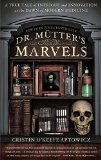Summary | Excerpt | Reviews | Beyond the Book | Readalikes | Genres & Themes | Author Bio
A True Tale of Intrigue and Innovation at the Dawn of Modern Medicine

Critics' Opinion:
Readers' Opinion:
First Published:
Sep 2014, 384 pages
Paperback:
Sep 2015, 384 pages
 Book Reviewed by:
Book Reviewed by:
Poornima Apte
Buy This Book
The first incision usually brought the patient's first scream—the first scream of many. Soon came the blood, the struggle, the shock. The patient would beg the surgeon to stop, plead and shout, and yell to the students to come save him, his voice cracking, tears streaming down his face. The surgeon was expected to ignore it all, to move forward swiftly and surely, and to hope that his assistants were strong men with equal resolve. Every student had heard stories of patients who were able to struggle free, who leapt off the table and attacked their doctors—often with the surgeon's own instruments!—before running out of the room, leaving a trail of their own blood behind them.
To Mutter, ignoring the patient was one of the most difficult parts of surgery. He struggled to develop the ability to temporarily see past the patient's pain—their wide and desperate eyes—and focus solely on his goals as the surgeon.
It had always been explained to him that the most important quality of a good surgeon is confidence, born of both education and experience. You needed to know you were right and that your actions were right, regardless of what was happening around you. Mutter understood this, but in the moment, it was often still a difficult instruction to follow.
Of course, in spite of the skill and care of the surgeon, the patients often died. Sometimes they died in the middle of surgery, the trauma to their bodies becoming too much. Sometimes they would die after, because their wounds were unable to stop bleeding, or the unwashed tools of their own surgeon had given them a fevered infection that consumed their flesh from the inside out. Under the best circumstances, the patient not only lived but lived a better life.
And it was this opportunity to improve a life that caused Mutter to be deeply attracted to studying surgery. Having spent so much time as a patient when he was a child—being bled by lancet or by leech, fed tinctures and bitter weeds, left to sweat it out alone in his bed or soaked in a special bath—he was perhaps too familiar with other, nonsurgical branches of medicine, where recovery was often a guessing game. Sometimes, the relief would be almost immediate once treatment had begun, but more often, the results were undefined, his chest rattling for weeks, his body left to grow gray and thin.
Surgery, however, was not a guessing game; it was an art. People came in need of relief, and the surgeons used every ounce of their skill and knowledge to provide it.
• • •
There was one more reason Mutter revered surgery above all other medical pursuits. Surgeons, unlike other professionals of the medical field, were successes of their own creation. While other doctors found their patients—and their positions in society—based on the family they were lucky enough to be born into, surgeons earned their place through hard work, study, and skill. In fact, it seemed to Mutter that the best surgeons came from the lower or middle classes. It was a "natural consequence of this state of things," one doctor from the era wrote, seeing that "very few persons entitled by birth or other advantageous circumstances . . . would condescend to study, much less engage in the practice of medicine," thus "poor and ambitious young men from the provinces were induced to repair to Paris and enter upon the study of the only profession through which they could expect to obtain distinction and worldly prosperity."
It was well known that several of the best-respected surgeons and physicians in France had risen from the lowest castes of life and many from the uttermost depths of poverty. Even the acclaimed chief surgeon of Hôtel Dieu, Guillaume Dupuytren, who was often referred to as the Emperor of Surgery, had been born poor and had struggled. Furthermore, he was not ashamed of it, but rather credited his background with his success, telling his students that "had not Monsieur Dupuytren been compelled from poverty to trim his student's lamp with oil from the dissecting-room, he never would have succeeded in becoming Monsieur le Baron Dupuytren."
Excerpted from Dr. Mütter's Marvels by Cristin O'Keefe Aptowicz. Copyright © 2014 by Cristin O'Keefe Aptowicz. Excerpted by permission of Gotham Books. All rights reserved. No part of this excerpt may be reproduced or reprinted without permission in writing from the publisher.





The Flower Sisters
by Michelle Collins Anderson
From the new Fannie Flagg of the Ozarks, a richly-woven story of family, forgiveness, and reinvention.

The House on Biscayne Bay
by Chanel Cleeton
As death stalks a gothic mansion in Miami, the lives of two women intertwine as the past and present collide.

The Funeral Cryer by Wenyan Lu
Debut novelist Wenyan Lu brings us this witty yet profound story about one woman's midlife reawakening in contemporary rural China.
Your guide toexceptional books
BookBrowse seeks out and recommends the best in contemporary fiction and nonfiction—books that not only engage and entertain but also deepen our understanding of ourselves and the world around us.